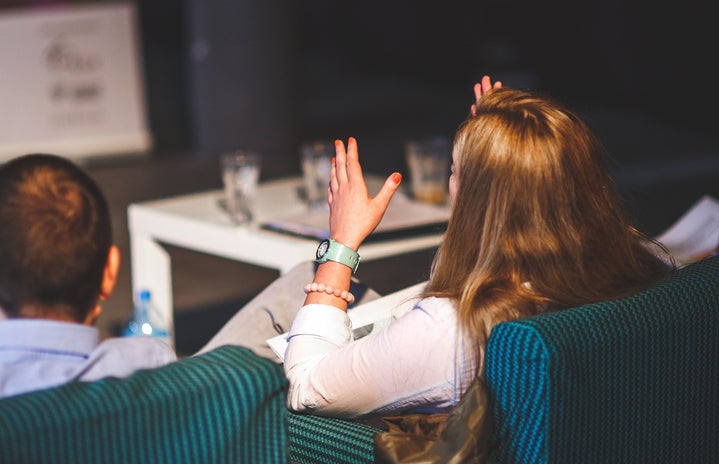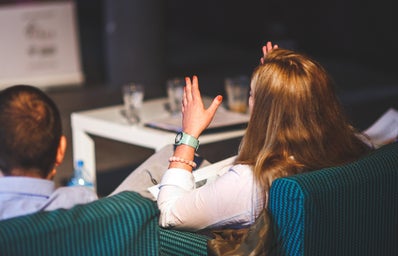Name: Zainab Ramahi
Program: Double Major in Knowledge Integration and Political Science, Minor in History
Year: 4A
Tell us a little bit about your involvement in the community.
I’ve been involved with social justice organizations ever since I was in highschool but in university I got more involved in the student organizations. I was an active member of the Knowledge Integration Society and I had different positions within that until I became the chair. I’ve been really involved with the Waterloo Public Interest and Research Group (WPIRG) and the Palestinian Solidarity Group, which are organizations that brings forth social and environmental justice initiatives. It’s fun finding these socially and politically aware communities. I think its really important to be a part of diverse communities in order to push yourself to expand but at the same time its reassuring to know that you have allies to work with. It’s good to have that community of support so you don’t feel like you’re just working on your own.
University allows you to learn outside of the classroom with the existence of these organizations. It took awhile but this really allowed me to learn how activism is developed. WPIRG and other organizations I’ve been involved with have helped me understand the differences between reactionary and short term resolutions to long term goals which will hopefully help us in the future. I hope to one day be an academic but I didn’t think that I wanted to do that for a really long time because I didn’t see them as relevant in the activism world. This was until I met professors who were both academics and activists simultaneously. It was through their academic work that they got their opinions through.
What are some of your recent achievements with your involvement in social activism?
It depends on what you define as achievements. I’ve had a lot of leadership and learning opportunities through my work. Attending conferences with other Palestinian Solidarity activists and organizers and understanding the importance of doing solidarity work across the board with the idea that you’re not just working for justice but also the smaller issues as well. In terms of actual achievements for me, especially as a senior student in university, has been giving other people the platform to develop their own leadership capabilities. I always like to think about how I can give someone else the opportunity to have their say so they will be leaders. You should always be developing the people around you. I put that at the front of my campaigns along with the organization’s goals along with the actual actions that you want to undertake.
How do you think being a student affects your social work?
I think being a student actually works against you. From turnover to co-op makes it difficult for a club to exist through the success of terms. Sometimes, when I look at it from a cynical perspective, I think that university is designed to stamp out any student organizations whatsoever. *laughs* I know that isn’t true but it’s definitely a challenge. It actually makes it even more encouraging to be involved within these organizations because you find students with similar concerns in terms of having stability and longevity within these groups. On the other hand, being a student makes it fun. We’re in a time where we have a certain amount of flexibility and we’re in control to some degree. We don’t have employers to be afraid of or a status quo to maintain. We’re a little more free. We’re surrounded by so much diversity that you’re able to exercise that freedom a little more. I definitely believe both academic atmospheres and student organizations have their advantages.
Were ever in conflict where you felt degraded for a certain reason if yes, what did you about it or how would you have changed that situation? If no, what is something that keeps you feel secure when you speak up?
Yes, I’m a muslim woman of colour, a visible minority, and I wear a headscarf. Other people identify me within various marginalized groups. And I think that rather than resisting that characterization, it is important to understand how to craft your own identity and what is important to you. I’ve had people come up to me and ask ‘’You’re a Muslim woman, tell me what all the other Muslim woman think about this one issue.’’ To which I reply, now that you’re listening to me, I’m going to use this opportunity to tell you what I can’t do that and this is why. For the first couple of years in university, these types of situations definitely left me jaded and irritated. People are so dismissive.
Until very recently, I was on the board of the YWCA for the Kitchener-Waterloo area in the midst of 15 other upper middle class White woman and I was the token young person and the token visible minority. It was really frustrating. It leaves you thinking that they have fulfilled some sort of quota by having you here. It’s a very demeaning attitude but rather than focusing on the negative aspect of that, it’s an important way to insert yourself into the discussion and make the most of it for everyone.
I don’t like to focus on myself a lot, which I think helps a lot. Yes systematic oppression is a thing and I am subjected to it but rather than focus on that, I would much rather focus on what ways I’m perpetuating the same systems of oppression and focus on the things that I actually have the power to change. whether or not they involve other people.
Have you overcome the issues that comes with being a visible minority?
I don’t think you can do that. I just think that not placing yourself in the center helps you realize the importance of doing work for other people. I will always struggle with issues of representation. There’s no place on earth that I can be considered a majority community. My parents are not from the same place. I can’t go back to their home countries and fully fit in. That can be really sad to think about sometimes. especially when you look at other people being a part of a dominant, white society, for example or even part of a patriarchy that serves for the purpose of men. I’m not a man and I’ll never feel that. But it’s important to be a part of a community where you’re a part of like minded individuals. You feel happy and comfortable with also recognizing that you want to be part of a greater community. But I came to university which made it easier because the community is so diverse. It really makes it easy to fit in. However, it’s important to be a part of a community who share the same values instead of just seeking out people who merely look like you.
What do advice do you have for other girls in your situation?
Understand how you can fit into the world. Respect yourself enough to find those spaces where you feel safe. There’s a lot you can learn from others that you won’t if you don’t put in the effort to build relationships. I, myself, am beginning to understand the power of that. You don’t need to be alone like a warrior going through the world. It’s important to build friendships.


